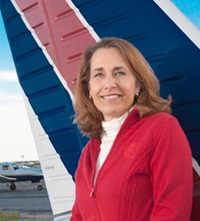

Kathy Yodice
- Attorney, Counsel to AOPA
- Former FAA attorney
- Has assisted AOPA members for more than 16 years
- Pilot since 1994, owns a Cherokee 180
The FAA construes compensation very broadly. The FAA is quick to point this out in interpretation after interpretation, case after case. According to the FAA, “the key consideration in determining if a private pilot is acting as pilot in command of an aircraft for compensation or hire is whether the pilot’s receipt of something of value is conditioned on the pilot operating the aircraft.” In the FAA’s view, compensation is anything of value. The FAA has not published a list of what they would consider valuable, but we can get some understanding from the examples that have come to their attention.
Certainly, compensation comes in the form of any payment of money, but it also includes those instances when no money is made on the flight or when the payment isn’t even enough to cover all of the expenses. The simple exchange of money to reimburse all or some of the expenses like fuel, transportation, lodging, or meals is usually enough. Compensation can also take the form of accumulation of flight time. Compensation can be good will or the expectation of future business. It could be the effect of furthering one’s economic interest or the prospect of a return favor. Something of value paid or given to a third party could be considered compensation if it is conditioned on the operation of the aircraft. For now, the FAA’s policy is to draw the line at considering charitable deductions of costs as compensation: “Since Congress has specifically provided for the tax deductibility of some costs of charitable acts, FAA will not treat charitable deductions of such costs, standing alone, as constituting ‘compensation or hire’ for purposes of the regulations.” But, that is about the only exception we’ve seen in practice. Otherwise, if you get something for taking the flight, the FAA is likely to call it compensation; if, in fact, you get nothing, you won’t have run afoul of the regulations.
For private pilot certificate holders, there are a few exceptions to the rule against receiving compensation associated with conducting a flight. For example, private pilots may seek reimbursement for flight expenses incurred in connection with a business flight as long as the flight is incidental to the pilot’s business and the flight does not carry passengers or cargo for compensation or hire. And, private pilots may share expenses with passengers provided all of the people on board the aircraft are on board for a common purpose, including the pilot, and the pilot pays his or her pro rata share of the operating costs such as fuel, oil, airport expenditures, or rental fees. Also, there is an exception for demonstration flights and tow operations.
The FAA tends to look at flight operations involving compensation fairly critically and with swift consequences if found to be contrary to the regulations. This is an area where you want to “know before you go.”
To continue reading, please log in or join AOPA now to have access to these exclusive expert resources.
Pilots know that there is a difference between a private pilot flight operation and a commercial pilot flight operation. And, for the most part, the difference between the two operations depends on whether there has been any compensation exchanged for the flight. If money passes from the passengers or the person responsible for the cargo on board, that would be considered compensation. But, could compensation mean more than money? You bet.



